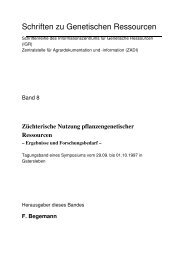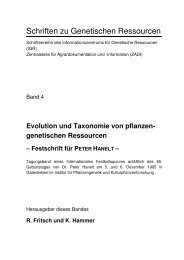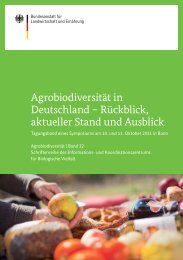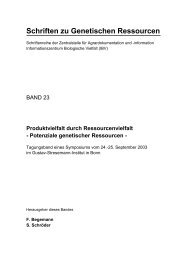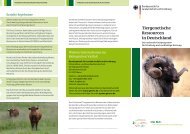Integration of Conservation Strategies of Plant Genetic ... - Genres
Integration of Conservation Strategies of Plant Genetic ... - Genres
Integration of Conservation Strategies of Plant Genetic ... - Genres
You also want an ePaper? Increase the reach of your titles
YUMPU automatically turns print PDFs into web optimized ePapers that Google loves.
<strong>of</strong> fruit trees still found in gardens <strong>of</strong> farms, olives throughout the mediterranean region and<br />
traditional cultivars <strong>of</strong> some vegetables in isolated regions. The security <strong>of</strong> such conservation is<br />
however low. The conservation <strong>of</strong> old cultivars <strong>of</strong> fruit trees could be stimulated by monitoring<br />
and encouraging farmers to maintain or rejuvenate such specimen. The conservation <strong>of</strong> genetic<br />
diversity <strong>of</strong> olives will require programmes at the national and regional level. It is doubtful wether<br />
conservation <strong>of</strong> traditional varieties <strong>of</strong> vegetables can be done reliably outside genebank<br />
programmes. Hence instead <strong>of</strong> in-situ conservation, perhaps the objective should be to reintroduce<br />
traditional varieties <strong>of</strong> cultivars, not as a means <strong>of</strong> conservation but as a means to widen<br />
their availability and use in the interest <strong>of</strong> both growers and consumers. Such actions are<br />
important in themselves in a society ruled by commercialism and ever increasing cultural<br />
uniformity.<br />
It is a curious phenomenon that while both the government and NGO programmes have a shared<br />
concern to maintain genetic diversity, there actions are <strong>of</strong>ten carried out in an atmosphere <strong>of</strong><br />
distrust and competition. Government genebank managers tend to emphasize what they consider<br />
as lack <strong>of</strong> pr<strong>of</strong>essionalism in NGO programmes. NGO's by and large see government genebanks<br />
as static frozen repositories <strong>of</strong> materials that threaten the control <strong>of</strong> people over their natural<br />
heritage. It is our opinion that such conflicting views are unnecessary and even damaging and<br />
require change. We suggest that integration <strong>of</strong> both approaches is to the general benefit and<br />
warrant serious attention. This requires a change <strong>of</strong> attitude and structural measures to promote<br />
a more collegial type <strong>of</strong> cooperation.<br />
NGO's should consider Government genebanks for what they are; a means to provide security in<br />
conserving overall genetic diversity for present and future use and provide genetic information<br />
on such collections. Government genebanks should see NGO's as a means to promote availability<br />
and maintenance <strong>of</strong> genetic diversity at the community level.<br />
Jointly, government genebanks and NGO's should argue for the need <strong>of</strong> changes in present<br />
legislation to promote rather than complicate and discourage the widest possible use <strong>of</strong> genetic<br />
diversity. Such legislation should stimulate NGO's to make planting material <strong>of</strong> traditional<br />
cultivars available to interested growers to increase genetic diversity. Like commercial breeding,<br />
community programmes should be allowed recover their cost and sell their products rather than<br />
be prohibited to do so by national and European regulations. Farmers and especially small growers<br />
and household gardeners should, if they want to, be able to have a wider choice <strong>of</strong> planting<br />
material than just the products <strong>of</strong> modern breeding. It is a sobering thought that past efforts <strong>of</strong><br />
farmers have given us almost all the crops in the form we grow them today. This should be<br />
recognized if genetic resources are to be truly a common good.



